Eurovision final: Evil Kate Bush, fiddlesticks and 5 other things to watch for
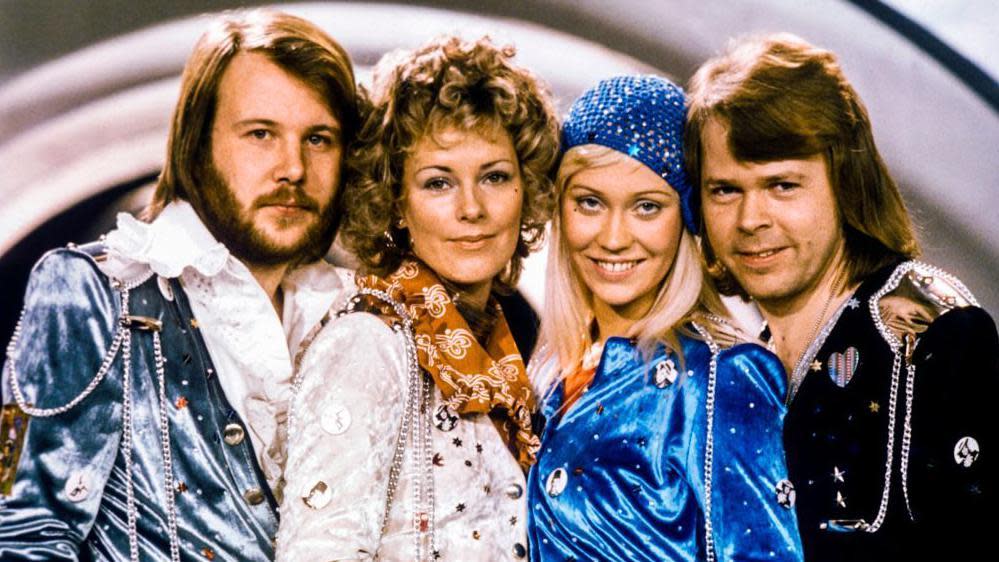
- Oops!Something went wrong.Please try again later.
- Oops!Something went wrong.Please try again later.
The Eurovision Song Contest reaches its grand final on Saturday night, with Croatia, Israel and Switzerland among the favourites to win.
The competition is back in its spiritual home in Sweden, 50 years after Abba's historic win in 1974.
Their winning entry, Waterloo, was the sort of oddity only Eurovision could produce: A glam rock anthem about the Napoleonic Wars, performed by two married couples in spangled trouser suits.
It just also happened to be one of the best songs ever written.
Abba's golden anniversary will be celebrated on stage in Malmö on Saturday, with former Eurovision winners Charlotte Perrelli, Carola and Conchita Wurst performing a special version of Waterloo.
But the competition has changed beyond recognition in the last five decades.
In 1974, only 17 countries took part in the competition, all accompanied by a live orchestra.
This year has seen 37 entrants, whose musical styles encompass heavy metal, hardcore techno, shimmering Europop and, in Norway's case, a gothic folk tale about a child who turns into a wolf and kills their stepmother. Fun times!
So here are some of the highlights to keep on your radar when the Grand Final kicks off on Saturday evening.
1) Evil Kate Bush
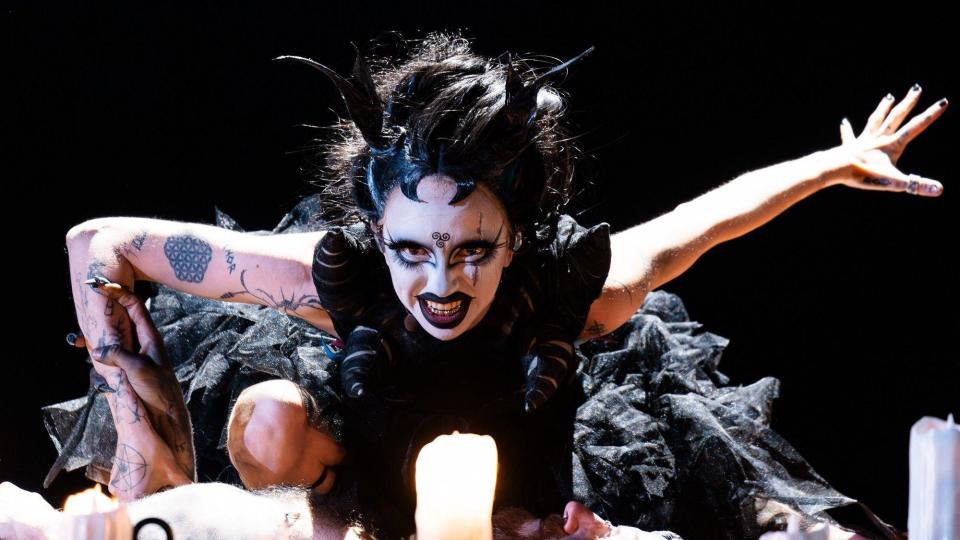
Eurovision loves nothing more than an outsider and an underdog - and Bambie Thug fits the bill perfectly this year.
When they won Ireland's national selection in January, eyes were rolled and insults were thrown. A priest even declared "Ireland is finished", accusing the non-binary artist of "shoving their orientation” in people's faces.
But guess what? Bambie's song, Doomsday Blue, is an absolute blast. A witchy, spooky blend of electro-goth and grinding metal guitars, that unexpectedly segues into a sweet melody of regret and heartbreak.
Bambie sells it with a genuinely cinematic performance, summoning a demon then dancing ballet with it, before wrapping things up with a cathartic scream.
Imagine Kate Bush's evil twin singing an anti-lullaby and you'll get the idea.
2) Finding Nemo
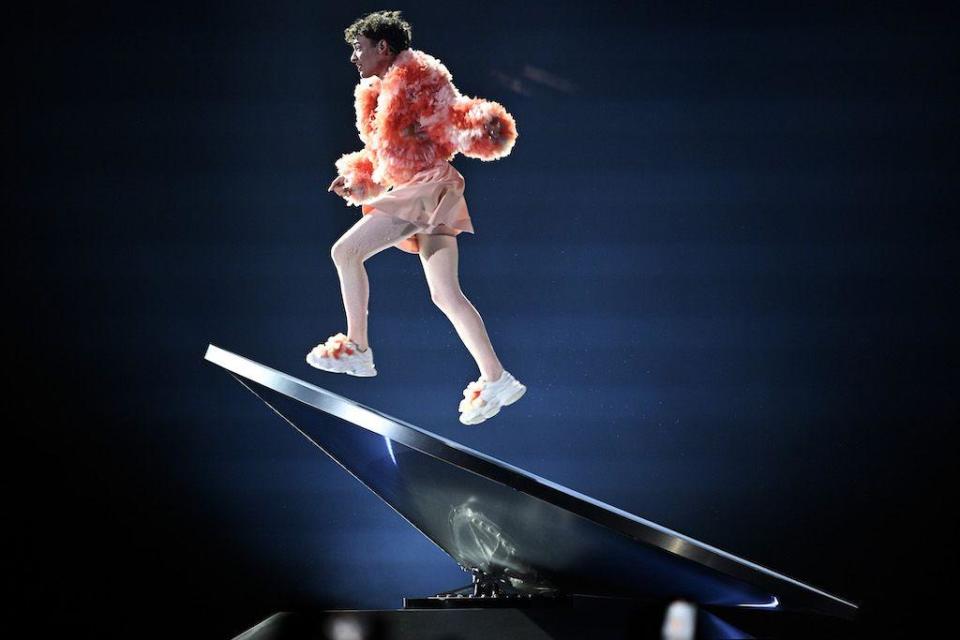
If Irish goths aren't your style, maybe you'd prefer a drum and bass EDM opera from Switzerland?
That's what we get from Nemo, who has become one of the favourites to win the contest with their song, The Code.
The 24-year-old performs it while balancing on a giant, spinning turntable - while hitting the highest of high notes (the chorus is inspired by Mozart's The Magic Flute, typically sung by a soprano).
Amazingly, there's no trickery involved.
"Someone asked me if I have magnets in my shoes," they said. "And I was like, damn, that would have been an amazing idea - because then I wouldn't have to worry about balancing all the time.
"It's always a little bit scary, but that's what makes it special for me."
3) Baby Lasagna's cinderella story
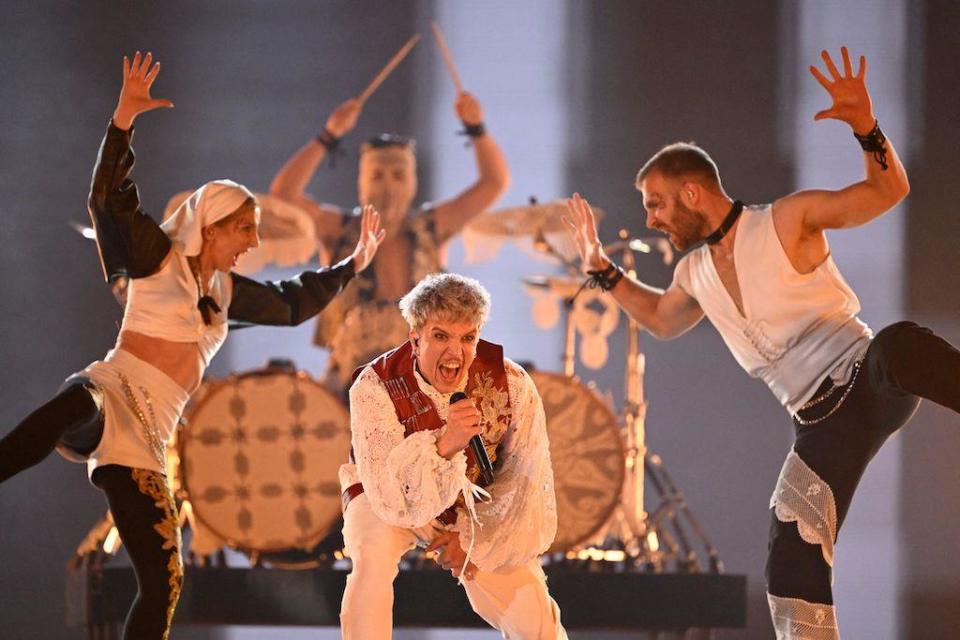
It all happened at the last minute.
In January, Croatian singer Zsa Zsa pulled out of the country's Eurovision selection process, and the gap needed filling. Producers called musician Marko Purišić, who performs as Baby Lasagna, and asked if he could step in.
He gave a tentative yes, then worked all weekend with his fiancé Eliabeta to pull together a performance.
Amazingly, his song - a techno-metal crossover called Rim Tim Tagi Dim - won by a landslide. Baby Lasagna scored 321 points, with the runner-up getting 82.
Now he's the bookies' favourite to win Eurovision, too, thanks to his raucous stage presence and a killer hook. (Keep an eye out also for an on-stage tribute to his one-eyed cat, Stipe).
After qualifying for the finals on Tuesday, Marko said it all seemed surreal.
"I remember writing Rim Tim Tagi Dim in my small room," he wrote on social media. "Never could I imagine this would happen. It still feels like I'm living somebody else's life."
As he says in the song, "there's no going back".
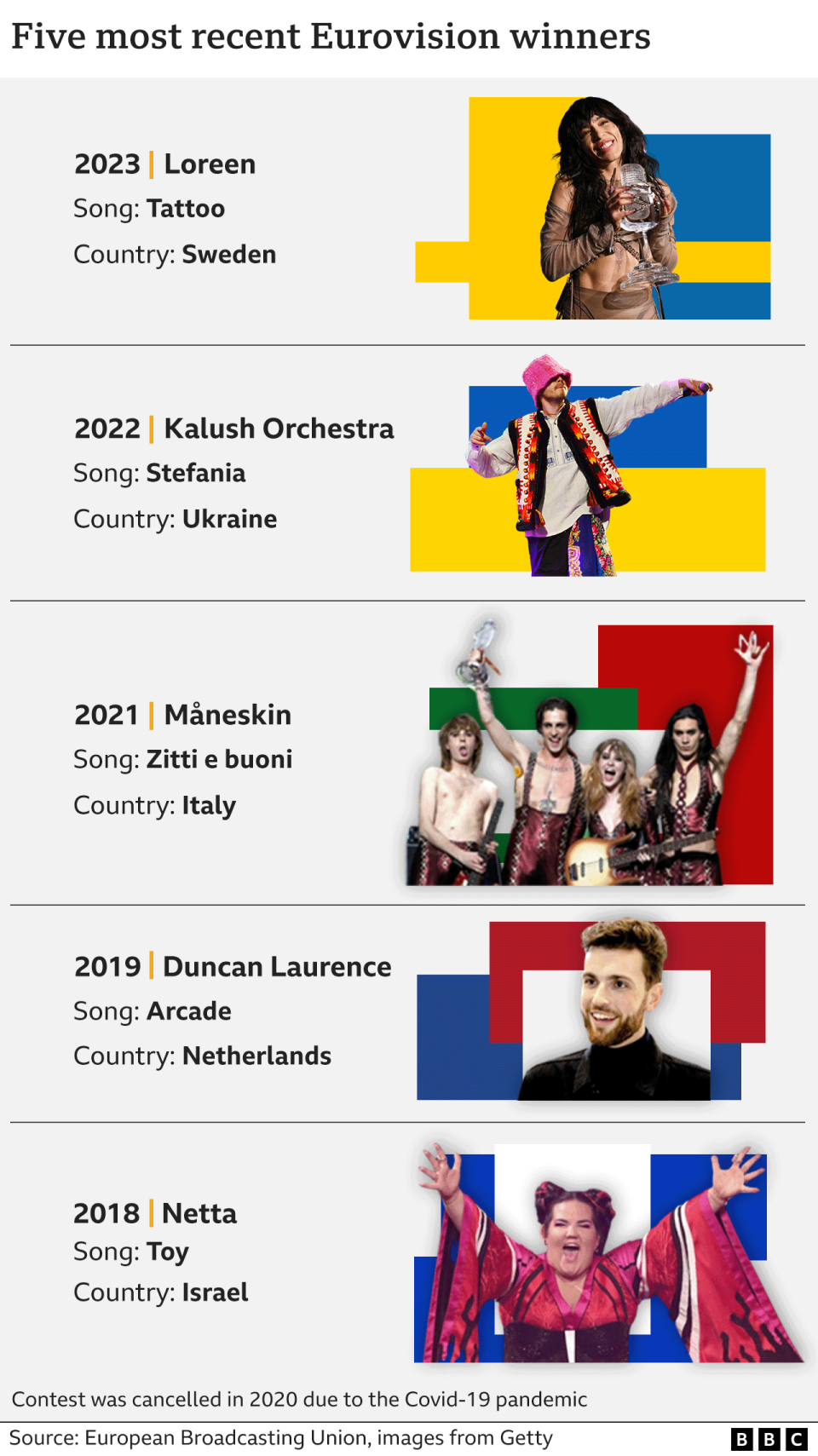
4) Fiddlesticks
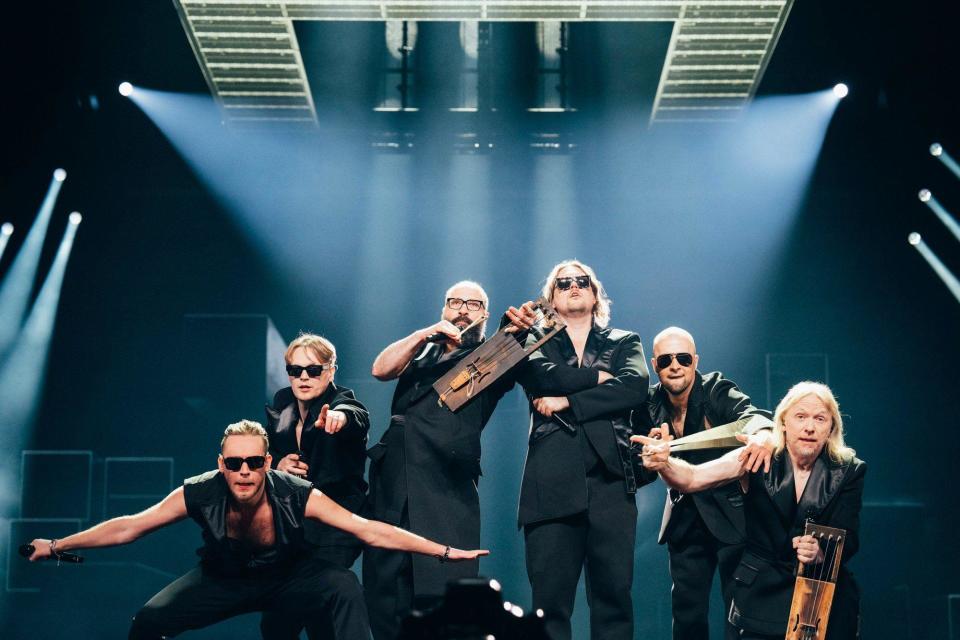
One welcome development at this year's contest is an influx of traditional music, alongside the usual Europop bangers and windswept ballads.
That means you'll see a few unfamiliar instruments onstage.
Estonia's 5Miinust x Puuluup (pictured) play a traditional bowed lyre called the Talharpas, while Norway's Gåte brandish the Nyckelharpa - another bowed instrument, originally built and played by farmers in the 17th Century.
Other countries, including Greece and Italy, fuse their country's folklore with modern sub-bass and Latin rhythms.
Armenia's Ladaniva even include a recorder solo in their infectiously catchy dance number Jako.
5) Olly Olly Olly (oy, oy, oy)
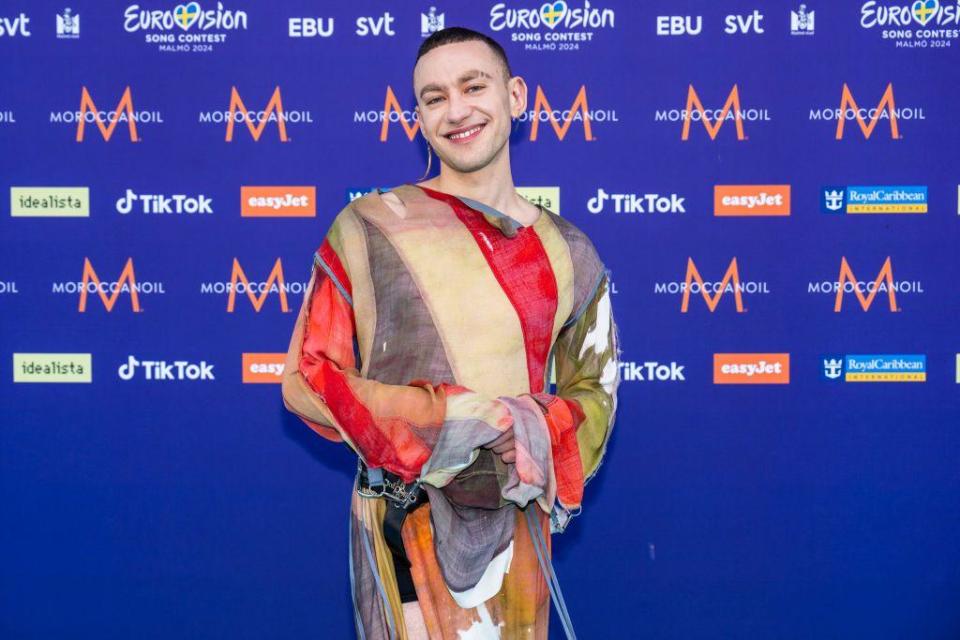
Representing the UK this year is Olly Alexander - who has some of the most ambitious staging of the night.
The official description of his set suggests he will "transport viewers into a post- apocalyptic dystopian boxing gym locker room, aboard a spaceship hurtling toward Earth through a black hole in 1985."
In practice, this means he's writhing around with four scantily-clad men, while clever camera trickery makes it look like he's Lionel Richie, dancing on his ceiling.
Alexander, who was formerly lead singer of the pop group Years & Years, comes with something very few British contenders have had in recent years: Stage experience.
That confidence and self-assuredness comes across on screen, but will it be enough to rescue the UK from the Eurovision dustbin?
"I was quite interested in the odds, so I had a look, and my chances of winning are one per cent," he confessed this week.
"But that's fine. It's better than zero."
That's the spirit.
6) Could Israel win?
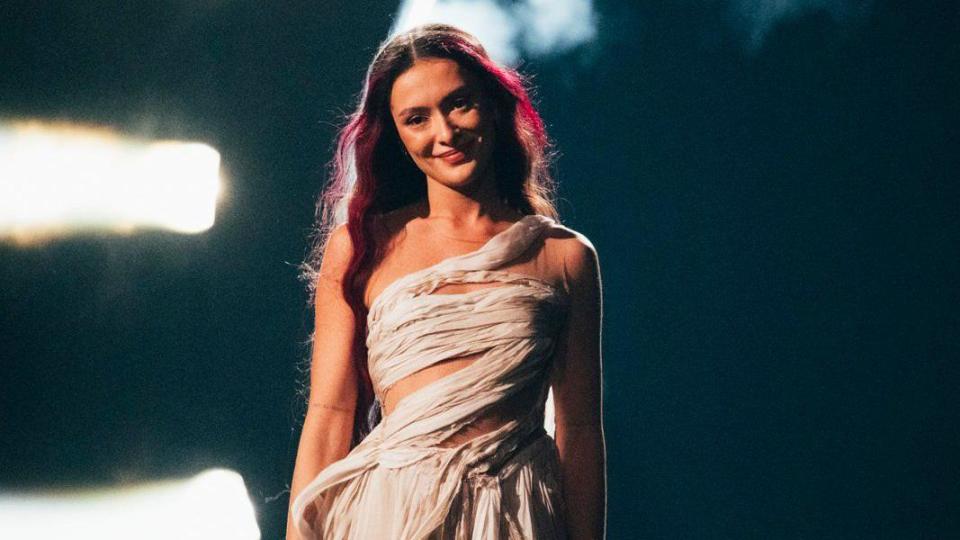
This is the contentious one.
Artists in several countries called for Israel to be suspended over its war against Hamas, and the humanitarian crisis in Gaza. Protests have taken place all week in Malmö, and another is planned for the day of the final.
Israel’s contestant Eden Golan also received some booing (as well as cheers) during Thursday's semi-final, and is being guarded by armed police during her stay in Sweden.
But here's the thing: Israel's song, Hurricane, is one of the strongest ballads in the contest.
Golan, who has handled herself with grace and composure throughout, has a stunning voice, and seems unaffected by the criticisms aimed at her (ourwardly at least).
Bookmakers have it as the second favourite to win... And it'll be interesting to see how organisers handle any further protests if Israel takes the trophy.
Although the EBU insists that the contest is apolitical, it's easy to envisage participants may consider pulling out rather than performing in Jerusalem or Tel Aviv next year, should the political landscape remain the same.
7) France's dark horse
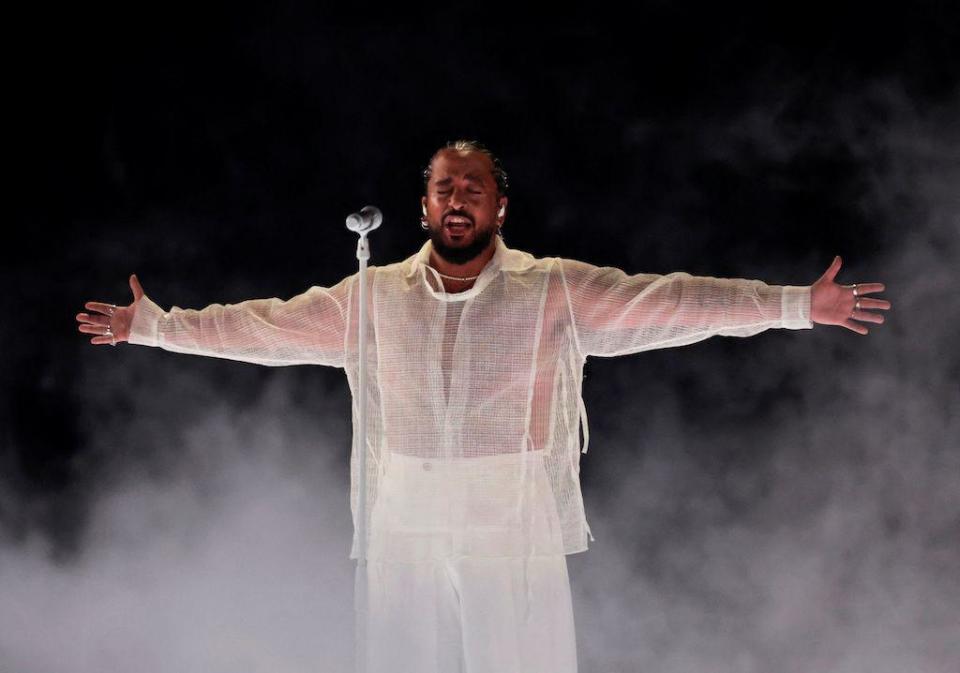
Watching rehearsals in the Malmö arena, only one act has made the assembled media stop in their tracks.
His name is Slimane Nebchi and he's one of France's biggest stars - with two million albums sold, 5 NRJ Music Awards and a Victorie de la Musique to his name.
On paper, his song Mon Amour is nothing to write home about. A textbook Gallic chanson that the New York Times dismissed as "a Frenchy McFrench, falsetto-laden ballad."
But there's a moment towards the end where Slimane takes three paces back from the microphone, and sings a capella: "Je t'aime, J’sais pas pourquoi."
It's a moment of scorching intensity that could see him sweep the jury vote, and maybe even swing the public in his favour.
Either that, or the Lasagna guy will win.
The Eurovision Song Contest is broadcast in the UK on BBC One, BBC Radio 2, BBC Sounds and the BBC iPlayer from 20:00 BST on Saturday, 11 May.

